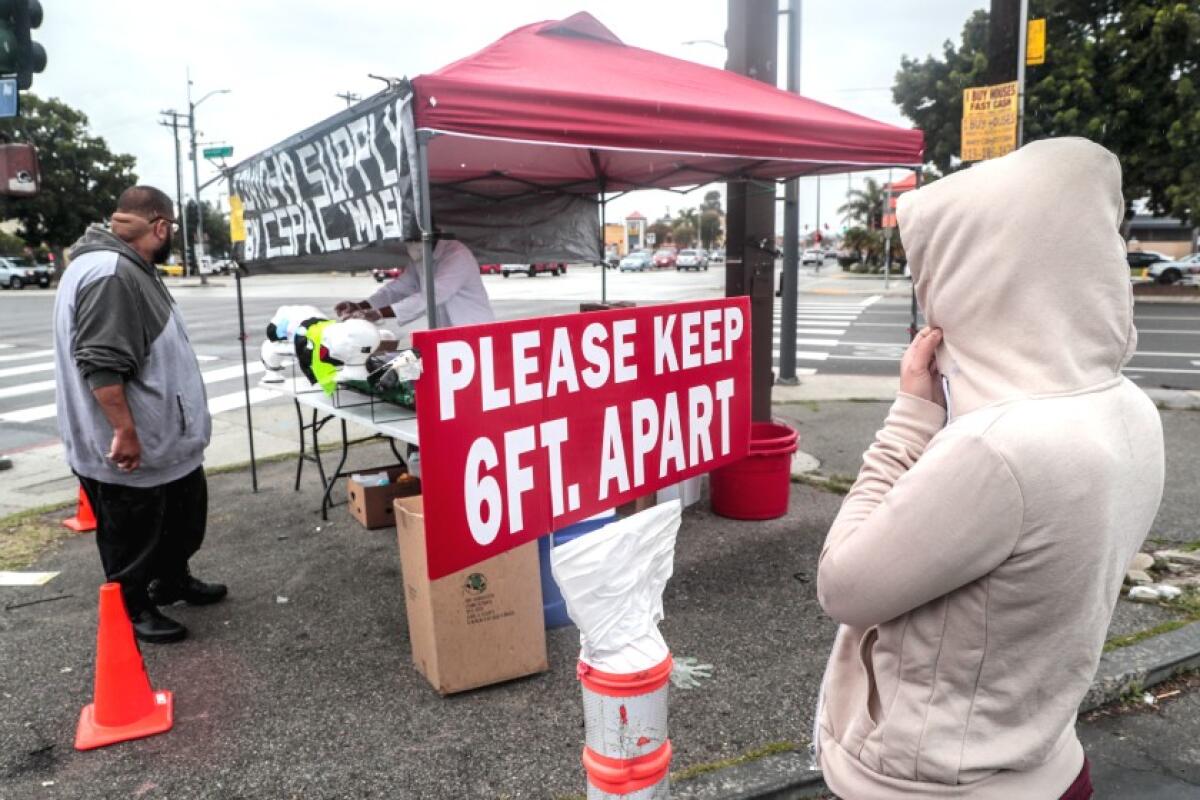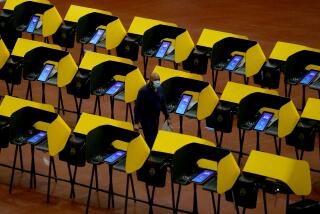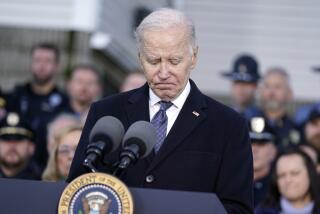California’s Latinos, Black people feel effects of pandemic most acutely, poll finds

Black people and Latinos are far more likely than white people in Los Angeles and statewide to report that the coronavirus has threatened their health, their jobs and their finances, a new poll shows — underscoring the degree to which the pandemic has widened existing racial and class inequities.
Nearly 7 in 10 Latino and Black voters in Los Angeles County, for example, said that the virus posed a “major threat” to their personal or family health, according to the poll from UC Berkeley’s Institute of Governmental Studies. About 6 in 10 Asian American voters said the virus was a major threat. By comparison, fewer than half of white voters reported the same level of concern.
The numbers were similar statewide, with about two-thirds of Black and Latino voters and 6 in 10 Asian Americans calling the virus a major threat to their own or their family’s health, compared with just under half of white voters.
Those perceptions largely match the reality of the pandemic, which from fairly early on became a disease that struck hardest at the region’s Latinos, many of whom hold service sector jobs that can’t be done remotely.
Los Angeles County officials said last month that Latinos were becoming infected at twice the rate of white residents. Black residents were also more likely to become infected than white residents, although the gap was significantly smaller, county data showed. Asian Americans were somewhat less likely to become infected, the county data showed.
The poll showed wide racial gaps in other ways that the virus has had an impact on people’s lives.
Nearly two-thirds of Latino voters in Los Angeles said the virus constituted a major threat to their employment, compared with just under half of Black and Asian voters and about one-third of whites. Latino voters who predominantly speak Spanish — a group heavily made up of immigrants— reported the greatest impact, with 78% seeing a major threat to their jobs.
Nearly half of Latino voters, 48%, said they or their families faced a “very serious” problem of not being able to pay for food or other necessities as a result of the coronavirus. Among Asian voters, 32% reported a very serious problem, as did 29% of Black voters. Among white voters the share fell to 18%.
Here too the heaviest impact has fallen on Spanish-dominant Latinos, with 74% saying they expect or are already contending with a very serious problem.
Because the poll was conducted among registered voters, who are necessarily citizens, it did not include the region’s large number of residents without legal status, who tend to be poorer than citizens and more often hold insecure jobs. As a result, the poll results may understate the degree of financial distress the virus has caused in the full population, especially among Latinos.
The poll shows “the disproportionate burden that communities of color in California shoulder as they and their families face serious health threats, as they in large part form the skeleton crews that keep the state’s service sector economy going during the pandemic,” said Berkeley sociologist Cristina Mora, co-director of the Institute of Governmental Studies,
Countywide, 3% of voters said they had tested positive for the virus, and 57% said they personally knew someone who had. The numbers were just slightly lower statewide.
While the experience of knowing people who have contracted the virus is widely shared, the poll found intense partisan divisions over how people perceive the threat and what to do about it, mirroring polling nationwide.
Asked to describe the health threat posed by the coronavirus in their local areas, for example, just over half of Democrats, 53% statewide, said it had become “much more serious.” Only 1 in 6 Republicans took that position, with one-third saying the situation had grown less serious and another third saying it had stayed largely the same.
The gap was even starker in Los Angeles, with 59% of Democrats countywide, but just 13% of Republicans, saying the health threat in their areas had become much more serious.
Democrats and Republicans also diverge on questions such as the effectiveness of masks, which President Trump has sometimes supported but often disparaged.
Statewide, 81% of Democrats and 66% of nonpartisan voters, but only 39% of Republicans, said they viewed masks as “extremely effective” in preventing a person from getting infected.
At the other end of the scale, 1 in 5 Republicans, but virtually no Democrats and only 4% of nonparty voters, said they viewed masks as “not at all” effective.
Not surprisingly, given those wide gaps in how they see the pandemic, voters on opposite sides of the partisan divide have very different views of policies to deal with it.
Among voters statewide, 61% believe that state, county and local officials moved too quickly to ease restrictions on business. That share rises to 80% among Democrats and 64% among nonparty voters, but drops to 22% among Republicans. Nearly three-quarters of Republican voters say that restrictions needed to be relaxed because of the economic damage they were causing. The party divisions in Los Angeles were almost identical to those statewide.
Nearly all Democrats statewide, 95%, said they “strongly support” a requirement that people wear masks in public places such as stores and offices. Among Republicans, that falls to 48%, with 24% saying they “somewhat” support a mask mandate and 28% opposing one.
Similarly, on the question of reopening schools this fall, only 2% of Democrats statewide and in L.A. County say they support a full return to in-person classes, as Trump has demanded. By contrast, 44% of Republicans statewide, and 46% in Los Angeles, support that.
Democrats and nonparty voters split between a hybrid approach that blends online and in-person teaching or a fully online school term. Statewide and in Los Angeles, a majority of Democrats favor online instruction while nonparty voters are somewhat more likely to favor the hybrid approach.
Views of how schools should reopen don’t differ widely by geography, even though the severity of the coronavirus outbreak has varied among different parts of the state. Nor do the views differ much between parents and non-parents.
“People talk about self-interest in politics,” but it pales in comparison to the partisan gap, said political scientist Eric Schickler, the co-director of the Berkeley institute. “You look at parents and non-parents, and they’re basically the same, and then you look at Democrats and Republicans, and there’s this big gap.”
Across racial and ethnic lines, the pandemic has also reinforced the region’s class divisions, with the heaviest impact falling on those with low incomes and fewer years of education.
For example, 57% of Los Angeles voters with household incomes of less than $20,000 said they were “extremely worried” about the risks they and immediate family members face from working outside their homes during the coronavirus outbreak. Among people with incomes of $200,000 and up, 38% expressed that level of concern.
Half of those with incomes of less than $20,000, but just one-third of those with incomes $200,000 and up, said they felt they had a “very serious” risk of getting sick. And just over half of those in the lowest income group, but only 1 in 8 in the highest group, said they faced a very serious risk of not being able to get needed medical care because of the virus.
That impact on inequality is widely recognized by voters: Statewide, 69% of voters agreed that the coronavirus was increasing inequality in the U.S., compared with 15% who disagreed.
On that, as on many other questions, Trump supporters stood out as an exception. Those voters who said they back Trump rejected the claim that the virus had worsened inequality, 48% to 33%.
The Berkeley IGS poll, supervised by pollster Mark DiCamillo, was administered online in English and Spanish from July 21 to 27 among 8,328 registered voters statewide. In addition, IGS conducted a sample for The Times of 2,036 Los Angeles County voters. Results for both samples were weighted to match known demographics of the voting population.
The margin of error for the full sample is estimated at roughly 2 percentage points in either direction. The margin of error for the countywide sample is estimated at 3.5 percentage points. Further details on the poll questions and data can be found at the Berkeley IGS website.
More to Read
Get the L.A. Times Politics newsletter
Deeply reported insights into legislation, politics and policy from Sacramento, Washington and beyond. In your inbox three times per week.
You may occasionally receive promotional content from the Los Angeles Times.











